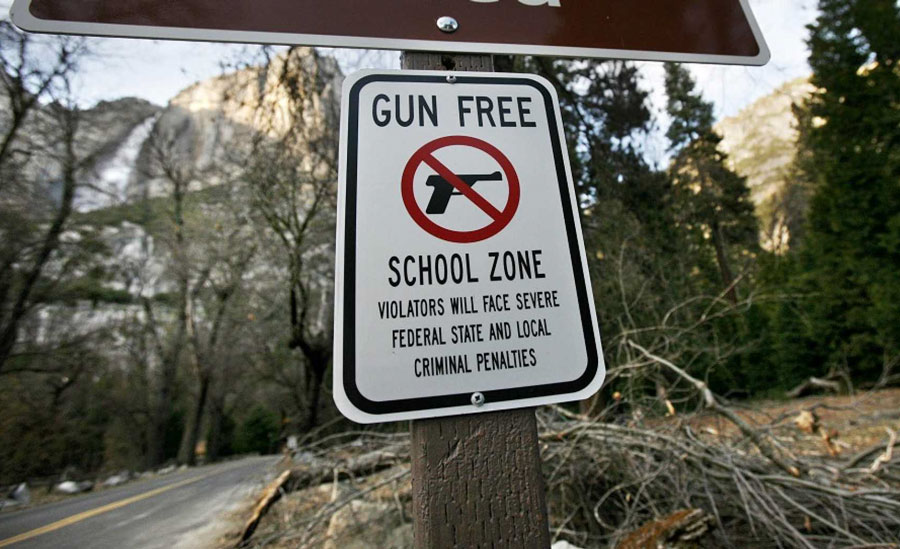
HOLLYWOOD, FL – The age of mass shootings is upon us. Deranged people periodically use firearms to massacre several innocent victims at a time. If a person wanted to kill as many people as possible, in as short a time as possible, with as little resistance and personal risk as possible, would they take up a gun and walk into a police station?
Mass shooter statistics show that such has not been the case. Mass shooters pick soft targets, such as schools, movie theaters, or places of worship.
Schools are among the kinds of places now referred to as “gun-free zones,” which include many other places, such as government offices, courthouses, and whichever private businesses so stipulate. But in an age of mass shootings, does it make sense to soften up society, making it more susceptible to massacre?
In an age of mass shootings, a “gun-free zone” is an insane idea. A bad guy with a gun must be stopped by a good guy with a gun.
And isn’t that why police carry guns?
Police carry guns in order to compel bad people to submit to authority, and to stop bad people from committing crimes and abuses. But in this age of administrative insanity, jurists and law enforcement executives argue that police have no duty to protect anyone. So if a deranged individual with a gun decides to attack innocent citizens, they cannot depend on police to do that which police exist and are paid to do.
The Supreme Court of the United States ruled in 2005 that police do not have a duty to protect anyone (refer to Warren v. District of Columbia). And U.S. District Judge Beth Bloom ruled in December 2018 that sheriff’s deputies had no duty to protect students who were being massacred on February 14, 2018 at Marjory Stoneman Douglas High School in Plantation, Florida, where 17 were killed and another 17 injured, reportedly by a single deranged shooter. Who then will protect those who are being massacred, if not themselves? (https:)
Ex-Sheriff Scott Israel, removed for cause on January 11, 2019 by Florida Governor Ron DeSantis, seems to agree with the courts. He implemented official policy allowing deputies to determine whether or not to intervene on the public’s behalf in case of shooting attacks. That discretionary leeway must have contributed to the decision by several deputies to stand down as so many were being murdered on February 14, 2018. But was that policy even legal?
The courts ruled. The sheriff implemented policy. And the deputies exercised discretion. But did the courts rule in accordance with law and reason? Did the sheriff implement policy that is compatible with law or not? Did the deputies stand down as a matter of permissible discretion, or did they actually act with culpable negligence, as far as law and reason are concerned?
The courts ruled that police have no duty to protect anyone. But law has something to say about it. According to Chapter 943 of Florida Statutes, every law enforcement official has a primary statutory responsibility to prevent crime. If a police officer is aware that a crime is under way, they must intervene, according to law, to prevent it from continuing.
Perhaps a pertinent question might be: Is it somehow possible for a police officer to stand down while murders are taking place, yet still be in compliance with their statutory responsibility to prevent crime?
Another pertinent question might be: How could the court rationally rule in opposition to clear law in regard to the statutory responsibility of law enforcement officials? And has the court ruled rationally in this case, since people were being slaughtered en masse?
In addition, ex-Sheriff Scott Israel implemented policy that clearly contradicts law. That severe administrative blunder unlawfully encouraged deputies not to act in accordance with their clear statutory responsibility to prevent crime. His policy, combined with the court’s ruling, is a toxic combination of lawless positions that encourages law enforcement officials not to do that for which the public pays them, and that which law requires of them.
Ultimately, several deputies exercised their discretion, deciding not to intervene as innocent victims were being murdered. They did so in accordance with court opinion and official policy, but in violation of law and in breach of duty.
Where does that leave the public? That leaves the public with the option of trusting others to defend and protect them, when such trust, under current conditions seems ill placed; or else to plan for their own defense.
And when it comes to gun-free zones, those areas into which no one may enter while armed, it leaves everyone in them at the mercy of any deranged shooter who decides that their day has arrived to wreak havoc and slaughter the defenseless.
But that is not the way it should be, as the public has an inviolable right to defend itself against killers, which right is infringed by the deranged imposition of gun-free zones.
Oddly, the Florida Legislature, rather than taking steps to support the right of law-abiding people to exercise their rights, responded to the mass shooting in Parkland by passing legislation that further curtails the right to bear arms.
Even though mass shootings in America are perpetrated almost exclusively by killers over the age of 21, the Florida Legislature, in its mindbogglingly anti-constitutional stupor, decided to ban the purchase of rifles and shotguns to young adults of between 18 and 20. This in no way addresses the safety needs of the public, and in no way increases school safety.



Comments are closed.